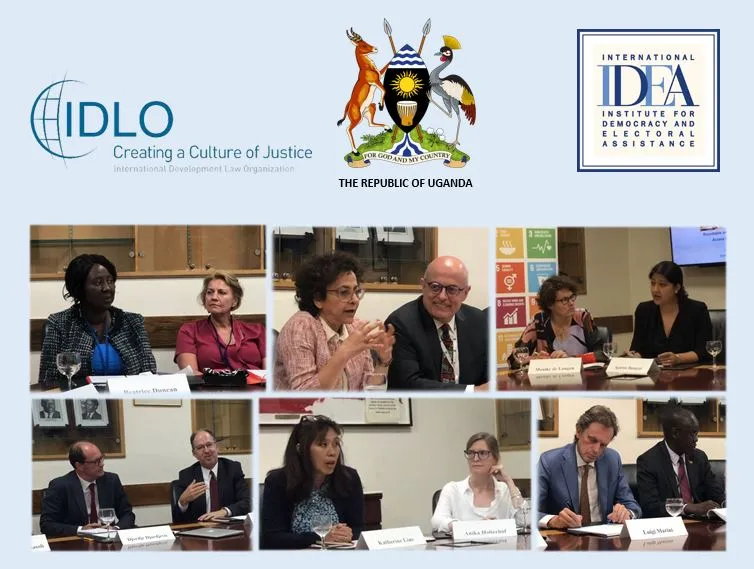Roundtable on Sustainable Development through Access to Justice and the Rule of Law

The theme of Sustainable Development Goal (SDG) 16 as an enabler for the United Nations (UN) 2030 Agenda in its entirety has been a common theme among member states, organizations, stakeholders, and civil society actors throughout the 2019 High-Level Political Forum (HLPF), held in New York from 9 to 18 July. The side-event “Roundtable on Sustainable Development through Access to Justice and the Rule of Law,” organized by International IDEA, IDLO, and Uganda’s Mission to the UN, included a discussion of the various issues covered in SDG 16 and the goal’s impact on the 2030 Agenda. The event was attended by Member State missions, UN agencies, and academic colleagues alike.
The Permanent Observer for International IDEA to the UN, Dr Massimo Tommasoli, opened the floor by addressing the Rome Conference held in May 2019 that covered SDG 16 as a goal itself and also as an enabler for the SDG framework as a whole. He also argued that SDG16 was negotiated as a compromise, which turned into a great opportunity for addressing the areas of rule of law, justice, peace and democratically accountable institutions while creating a dialogue among different communities of practice. The work of International IDEA is very relevant to SDG 16.6 and 16.7, which is addressed in the “Global State of Democracy Indices” and in the “Global State of Democracy Report” available on IDEA’s website. The indices are an interactive online tool that covers many aspects of democracy, including fundamental rights, representative government, participatory engagement, impartial administration, and checks on government, which is fundamental in monitoring the global implementation of the 2030 Agenda. International IDEA also provides knowledge and assistance on democracy and the rule of law, including in such areas as electoral justice, constitutional building and reform process, timing and sequencing of elections, and regulatory frameworks on the funding of political parties.
Dr Tommasoli also emphasized the significance of the “SDG16 Data Initiative 2019 Global Report” that was launched recently by International IDEA in partnership with the SDG16 Data Initiative’s member organizations. The report focuses on the importance of using non-official data to capture dimensions of governance, justice, and the rule of law that are not analyzed by the indicators included in the original framework from 2015. Civil justice, as an example, is one indicator that is especially addressed by non-official data sources. According to Dr. Tommasoli, combining official and non-official data is an effective endeavor in providing a more comprehensive picture of how countries are proceeding in achieving the agenda’s targets, which in turn facilitates the further implementation of the 2030 Agenda.
The Report “WJP Rule of Law Index 2019” launched by the World Justice Project was also addressed during the event by Ms. Irene Kahn (IDLO). The Report shows more countries declining on issues concerning rule of law instead of improving, which necessitates governments, international agencies and organizations, and civil society groups finding ways to bridge that gap and get closer to a concrete achievement on SDG 16, especially SDG 16.3 (rule of law and justice). Institutions play a crucial role in justice, peace and security; therefore, building confidence in institutions is necessary for the achievement of the goal. Ms. Kahn (IDLO) also stated that “issues of justice and rule of law are much more than a technical exercise, it is about recognizing the various systems that exist in a particular society and addressing the issues while bringing in ownership.” People from all walks of life must also be brought into the conversation and in local decision making processes in order to increase accountability and transparency.
Issues such as access to justice, investment in justice, restorative justice, confidence in the activity of judicial bodies, technological innovations for the SDGs, the rule of law and equal opportunities were all addressed as the meeting went on. Supporting civil society and enabling access to justice, in particular to marginalized populations, are crucial to achieving the SDGs. According to Ms. Aparna Basnyat (UNDP), in order to “sustain peace and prevent future violence, there must be an investment to address this marginalization and also in governance and institutions.”
Participants agreed that participation is a key link to the rest of the agenda. SDG16 is considered an enabler for all of the SDGs and the broader 2030 Agenda framework. Because of this, governments must participate and include civil society in the decision making process and legal frameworks. Political participation and laws must be inclusive of women and youth as they play a crucial role in addressing civil justice in the implementation of the 2030 Agenda. Ambassador Philip Odida (Mission of Uganda to the UN) argued that planning for national development has to be inclusive of all. The 2030 Agenda is about empowering the people and having a safe and just society based on an environment of peace, social inclusion, rule of law and national collaboration.
The side-event was moderated by Djordje Djordjevic (IDLO), and included the participation of a wide variety of stakeholders: Pablo de Greiff, UN Human Rights Council Experts Group on Prevention; Luigi Marini, Mission of Italy; Aparna Basnyat, UNDP; Maaike de Langen, Just and Inclusive Societies; Anika Holterhof, UNODC; Katherine Liao, OHCHR; Beatrice Duncan, UN Women; Irene Kahn, IDLO; Massimo Tommasoli, International IDEA; Ambassador Philip Odida, Uganda Mission to the UN; and Annette Lyth, Office of the Special Representative of the Secretary-General on Violence against Children.
In conclusion, SDG16 is a goal on itself and also an enabler for the 2030 Agenda framework. It is important to address the issues and solutions of all the SDGs through the linkages found in their targets and indicators. SDG16 is critical for building peaceful, just, strong institutions, and inclusive societies, while enhancing the successful achievement of the 2030 Agenda.




